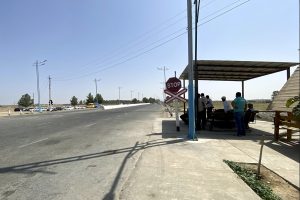Since the Taliban took power in Afghanistan, its northern neighbor, Uzbekistan, has helped Western powers evacuate thousands of at-risk Afghans by allowing planes to refuel and passengers to transit to safe, third countries. Uzbekistan is also temporarily hosting hundreds of Afghan pilots and their families who covertly fled Afghanistan. These were important contributions to the evacuation effort, but looking ahead, Uzbekistan can and should do more.
Crucially, Uzbekistan could be an important gateway for tens of thousands of Afghans identified by other governments as eligible for visas or resettlement but who not been able to leave the country. Uzbekistan could open its border to Afghans fleeing persecution, too. Helping Afghans at risk of persecution, torture, or even death at the hands of the Taliban would be in line with Tashkent’s human rights obligations and its broader readiness to play a more significant role on the international stage.
In recent weeks, Uzbekistan has allowed the U.S., Germany, and other governments to evacuate thousands of Afghans through its territory. In addition, it is hosting several hundred Afghans who fled, including 585 Afghan pilots and their family members who flew into Uzbek territory after the Taliban seized Mazar-i-Sharif on August 14.
Uzbekistan has reportedly reached out to the United States to relocate the pilots and their families. A U.S. State Department spokesperson said Washington is “coordinating with the government of Uzbekistan in response to Afghan Air Force aircraft, their pilots and others crossing into Uzbekistan.”
Problematically, though, Uzbekistan has closed its border to Afghan refugees. Uzbekistan is not a signatory to the 1951 United Nations Refugee Convention, but it still has an obligation under international human rights law not to return people to places where they risk persecution.
Uzbekistan said on August 20, in fact, that it had returned 150 people to Afghanistan, based on an agreement with the Taliban. This is of deep concern, as Uzbekistan is bound by the customary international law principle of nonrefoulement not to return people to places where they risk persecution, nor to return people to situations where they face a risk of ill-treatment or torture.
In a positive step, since August 31, the deadline for all foreign troops to withdraw from Afghanistan, Uzbekistan has agreed to provide continued transit assistance to Afghans with German visas or residency. Following talks with the Uzbek government, Germany’s Foreign Minister Heiko Maas said that Uzbekistan had agreed to permit transit to Afghans eligible for onward travel to Germany, although details still had to be sorted out.
The Uzbek government should extend that same good will to Afghans who are eligible for or already possess visas to other third countries. Uzbekistan should allow them entry so their visas can be processed while they are in a safe location, before they continue onward travel.
Uzbekistan should also heed the recent call from UNHCR, the United Nations refugee agency, that bilateral evacuation programs should not “hamper or preclude the possibility for Afghans the right to seek asylum.” In its August 20 statement, UNHCR’s spokesperson noted that, “All states… must preserve the right to seek asylum for Afghans arriving through regular or spontaneous means.”
Governments working with Uzbekistan to evacuate Afghans to third countries should offer financial support to Tashkent to underpin this work, and for hosting at-risk Afghans at the Afghanistan-Uzbekistan border.
Offering to host transiting Afghans and Afghan asylum seekers is not only the rights-respecting and compassionate thing to do; it would undoubtedly save lives and require a manageable commitment on the part of the Uzbek government.
Since President Shavkat Mirziyoyev came to power in 2016, Uzbekistan has sought to show the world it has turned a page from its authoritarian past. It joined the U.N. Human Rights Council, for example, and the president publicly claimed his government has made “human rights central to reforms” in the country.
There is still much work to do before Uzbekistan can claim membership in the ranks of rights-respecting countries. But by stepping up to help at-risk Afghans and opening its borders to those fleeing, Uzbekistan would certainly be making a meaningful contribution to the efforts of governments that are still trying to carry out evacuations, and, most important, to the lives and wellbeing of the Afghans who are still at risk at the hands of the Taliban.
































